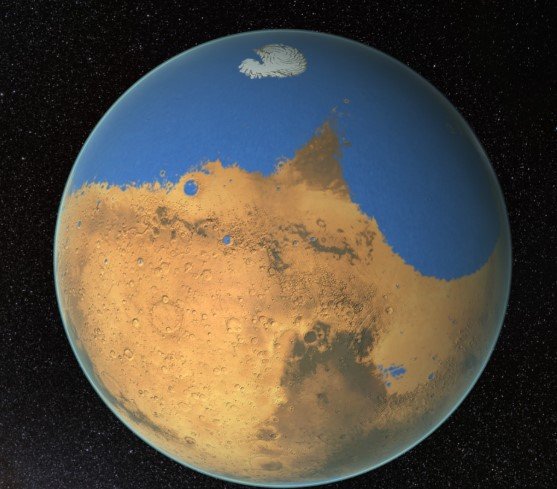Mars was once home to vast oceans and sandy beaches, new research suggests. Data from China’s Zhurong rover has revealed buried coastal deposits beneath the planet’s surface, offering the strongest evidence yet that water played a major role in shaping the Red Planet’s history.
New Clues Beneath the Martian Surface
Since the 1970s, when NASA’s Mariner 9 orbiter first captured images of water-sculpted landscapes, the presence of water on Mars has been an open question. Now, findings published in the ‘Proceedings of the National Academy of Sciences (PNAS)’ suggest that a massive ocean once covered parts of Mars’ northern hemisphere.
A research team led by Jianhui Li of Guangzhou University, in collaboration with American scientists, analyzed imaging data from Zhurong, a Chinese rover that landed on Mars in 2021. Beneath the planet’s dusty surface, they found sedimentary layers resembling those found in Earth’s coastal regions. The composition and patterns of these deposits strongly suggest they were shaped by waves and currents billions of years ago.
A Planet Once Rich in Water
Evidence of Martian water stretches back to 4.5 billion years ago, with ice still present under the surface today. But how much liquid water existed, and for how long, has been an enduring mystery. This latest discovery suggests that oceans were not only present but may have persisted for an extended period before vanishing.

Scientists believe this ancient ocean, called Deuteronilus, covered nearly half the planet at its peak. If confirmed, this would support the theory that Mars had an active hydrological cycle, possibly even suitable for microbial life.
- Coastal sediments suggest an ocean at least 3.6 billion years ago.
- The Zhurong rover’s radar detected layered formations consistent with ancient shorelines.
- These findings align with previous data from NASA’s Perseverance rover, which landed months before Zhurong.
How the Ocean Disappeared
If Mars had vast oceans, what happened to them? Scientists propose several possibilities. Some believe Mars lost its water due to atmospheric erosion caused by solar winds after the planet’s magnetic field weakened. Others suggest the water may have gradually seeped underground, where remnants of it still exist as ice.
Another theory points to volcanic activity. Mars is home to Olympus Mons, the largest volcano in the solar system. Frequent eruptions may have altered the planet’s climate, triggering water loss over time.
The Implications for Future Exploration
Mars’ watery past has direct implications for future space missions. Understanding the history of its oceans could help scientists determine whether life ever existed on the planet. It also raises questions about the possibility of accessing subsurface ice for human exploration.
China’s Zhurong rover is currently in hibernation due to dust accumulation on its solar panels, but data from its mission continues to reshape our understanding of the Red Planet. Meanwhile, NASA’s Perseverance rover continues to explore Mars’ Jezero Crater, a region believed to have once been a lake.
As researchers dig deeper into the planet’s past, Mars’ story is becoming clearer. A world that once had water, shorelines, and potentially even habitable conditions is now a barren desert. But with ongoing exploration, the search for life—and the mysteries of Mars’ lost oceans—are far from over.
